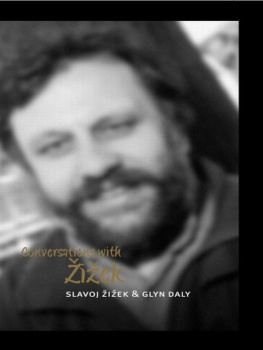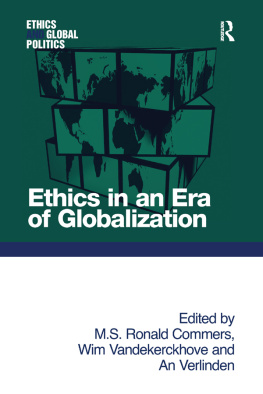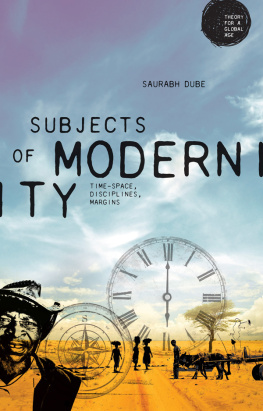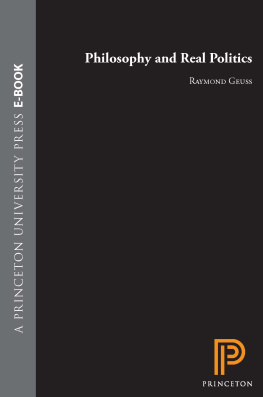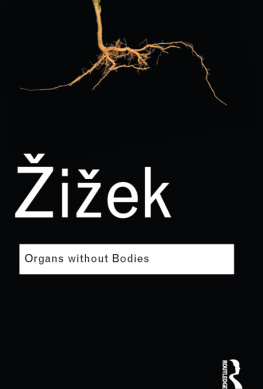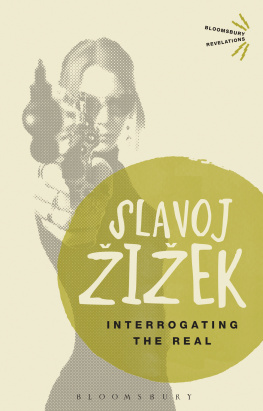Daly Glyn - Conversations with Žižek
Here you can read online Daly Glyn - Conversations with Žižek full text of the book (entire story) in english for free. Download pdf and epub, get meaning, cover and reviews about this ebook. City: Cambridge;Slovenia, year: 2004, publisher: Wiley;Polity, genre: Religion. Description of the work, (preface) as well as reviews are available. Best literature library LitArk.com created for fans of good reading and offers a wide selection of genres:
Romance novel
Science fiction
Adventure
Detective
Science
History
Home and family
Prose
Art
Politics
Computer
Non-fiction
Religion
Business
Children
Humor
Choose a favorite category and find really read worthwhile books. Enjoy immersion in the world of imagination, feel the emotions of the characters or learn something new for yourself, make an fascinating discovery.
- Book:Conversations with Žižek
- Author:
- Publisher:Wiley;Polity
- Genre:
- Year:2004
- City:Cambridge;Slovenia
- Rating:4 / 5
- Favourites:Add to favourites
- Your mark:
- 80
- 1
- 2
- 3
- 4
- 5
Conversations with Žižek: summary, description and annotation
We offer to read an annotation, description, summary or preface (depends on what the author of the book "Conversations with Žižek" wrote himself). If you haven't found the necessary information about the book — write in the comments, we will try to find it.
Conversations with Žižek — read online for free the complete book (whole text) full work
Below is the text of the book, divided by pages. System saving the place of the last page read, allows you to conveniently read the book "Conversations with Žižek" online for free, without having to search again every time where you left off. Put a bookmark, and you can go to the page where you finished reading at any time.
Font size:
Interval:
Bookmark:
CONVERSATIONS
Published
Bauman & Tester, Conversations with Zygmunt Bauman
Beck & Willms, Conversations with Ulrich Beck
Castells & Ince, Conversations with Manuel Castells
Giddens & Pierson, Conversations with Anthony Giddens
iek & Daly, Conversations with iek
Forthcoming
Eagleton & Milne, Conversations with Terry Eagleton
Hall & Schwarz, Conversations with Stuart Hall
Sennett & Klinenberg, Conversations with Richard Sennett
Conversations
with
iek
Slavoj iek and Glyn Daly
polity
Copyright Slavoj iek and Glyn Daly 2004
The right of Slavoj iek and Glyn Daly to be identified as
Authors of this Work has been asserted in accordance with the
UK Copyright, Designs and Patents Act 1988.
First published in 2004 by Polity Press in association with
Blackwell Publishing Ltd.
Reprinted 2004, 2005, 2008 (twice)
Polity Press
65 Bridge Street
Cambridge CB2 1UR, UK
Polity Press
350 Main Street
Malden, MA 02148, USA
All rights reserved. Except for the quotation of short passages for the purposes of criticism and review, no part of this publication may be reproduced, stored in a retrieval system, or transmitted, in any form or by any means, electronic, mechanical, photocopying, recording or otherwise, without the prior permission of the publisher.
ISBN: 978-0-7456 2896-7
ISBN: 978-0-7456 2897-4 (pb)
A catalogue record for this book is available from the British Library and has been applied for from the Library of Congress.
Typeset in 11 on 13 pt Berling
by SNP Best-set Typesetter Ltd., Hong Kong
Printed and bound in the United States by Odyssey Press Inc.,
Gonic, New Hampshire
For further information on Polity, visit our website:
www.polity.co.uk
Glyn Daly
An anecdote by Lacan recounts a chance remark made by Freud to Jung. Following an invitation from Clark University, the two psychoanalysts travelled to the United States and upon arrival in New York harbour Freud gestured towards the Statue of Liberty and said, They don't realize that we're bringing them the plague. In today's world we might say something similar about iek. That is to say, in the context of the platitudes and triteness of a predominantly postmodern culture iek represents the philosophical equivalent of a virulent plague or perhaps, to update the metaphor, a computer virus whose purpose is to disrupt the comfortable appearances of what might be called the matrix of globalliberal-capitalism. Continuing in a certain Cartesian tradition, what iek infects us with is a fundamental doubt about the very presuppositions of our social reality. But this is merely the starting point of a much wider ethico-political engagement with a radical emancipatory universalism; one that is capable of taking on the increasingly prohibitive nature of contemporary capitalism and its corresponding forms of political correctness and multiculturalism.
iek's work has been at the forefront of philosophical, political and cultural debate for more than a decade. From the theory of ideology to the critique of subjectivity, ethics, globalization, cyberspace, film studies, cognitivism, theology, music and opera, iek's influence extends far and wide and his interventions continue to provoke controversy and to transform the way we think about these and other topics. To pick up a text by iek is to be confronted with a heady mix of elements: bold propositions, bravura of style and an intellectual audaciousness that does not flinch from moving between the heights of conceptual abstractions and the seemingly base and voluptuary aspects of popular and sensuous life. The latter however is not simply an exercise in cerebral pyrotechnics but aims at something more precise. Indeed, we might characterize iek's discourse as an ongoing demonstration of the inextricable connection between what might be called the levels of the divine, or eternal, and our immediate lived realities. From Kant to cunnilingus iek seeks to remind us that, in the Hegelian sense, the spirit is always a bone and that we cannot separate the most intimate of physical experiences from their transcendental dimensions.
It would be futile to try and summarize the work of someone who is without doubt one of the most prolific and prodigious thinkers of our age. In this brief introduction I will instead focus on certain fundamental themes that run throughout iek's thought and elaborate these in the context of his more recent, and ongoing, interventions in philosophico-cultural and political life.
The constitutive madness of being
The iekian paradigm if we can speak of it in those terms draws its vitality from two main philosophical sources: German idealism and psychoanalysis. In both cases, iek's central concern is with a certain failure/excess in the order of being. In German idealism this aspect is made increasingly explicit through reference to what can be called an unaccountable madness that is inherent to, and constitutive of, cogito and subjectivity as such. For Kant this is the dimension of diabolical Evil while for Schelling and Hegel it is the night of the self and the night of the world respectively. The point is that, in each of these cases, there is an increasing emphasis on negativity as the fundamental (and ineradicable) background to all being.
As iek makes clear in The Ticklish Subject, what German idealism accomplishes is a displacement of the usual opposition between the idea of the savage pre-human self and the symbolic universe of civiliZed human subjectivity (where in the Enlightenment tradition the latter is identified with the Light of Reason and as something which affects an ultimate mastery, or pacification, over the former). Instead, what is affirmed is a view of subjectivity that can only come into being as a passage through madness; as an ongoing attempt to impose a symbolic integrity against the everpresent threat of disintegration and negativity (iek, 1999: 3441).
In psychoanalysis this thematic aspect of dislocated subjectivity is developed further in respect of the Freudian notion of death drive. Death drive emerges precisely as a result of this gap in the order of being a gap that simultaneously designates the radical autonomy of the subject and is something that constantly threatens to sabotage or overwhelm the symbolic framework of subjectivity. In Freud the category of death is not simply a cancellation but refers rather to the (immortal) dimension in subjectivity that persists beyond mere existence or biological life. As iek puts it: Human life is never just life, it is always sustained by an excess of life (iek, 2001: 104). This excess of life is death drive. And it is in the context of the latter that both Freud and (especially) Lacan identify the peculiarly human motivation in regard to jouissance: that is, a basic compulsion to enjoy; to achieve consummate satisfaction and thereby heal the gap, or wound, in the order of being.
The human condition is marked by an eternal and impossible attempt to bring about some sort of resolution to this drive; a paradoxical drive to resolve drive as such. In this way, drive becomes attached to certain objects of excess (the ideal experience, lifestyle, possession etc.) Lacan's objets petit a that hold the promise of, at least partial, fulfilment
It is in these terms that iek insists on a Lacanian reading of the subject. In certain post-structuralist and deconstructivist circles where the emphasis is on a notion of multiple-being that is always provisionally configured within sliding planes of diffrance the idea of the subject has become rather unfashionable as it allegedly conjures up the image of a unified Cartesian identity or some kind of centre to subjectivity. But as iek has consistently stressed, the subject is neither a substantial entity nor a specific locus. Rather, the subject exists as an eternal dimension of resistance-excess towards all forms of subjectivation (or what Althusser would call interpellation). The subject is a basic constitutive void that drives subjectivation but which cannot ultimately be filled out by it (iek, 1990: 254). It is simultaneously the lack and the leftover in all forms of subjectivation. This is why the Lacanian mark for the subject is $ (the barred, empty subject). The subject cannot find its name in the symbolic order or achieve full ontological identity. Using Lacan's expression, the subject always remains as a bone stuck in the throat of the signifier. And insofar as the subject is linked with the radical negativity of the death drive it also reflects the same kind of tension identified in German idealism. Thus the subject is both the movement away from subjectivation the excess that engulfs symbolic coherence in an entropic night of the world and the very drive towards subjectivation as a way of escaping such a condition (iek, 1999: 159). In this sense identification is always structured in terms of a certain being-towards-madness.
Font size:
Interval:
Bookmark:
Similar books «Conversations with Žižek»
Look at similar books to Conversations with Žižek. We have selected literature similar in name and meaning in the hope of providing readers with more options to find new, interesting, not yet read works.
Discussion, reviews of the book Conversations with Žižek and just readers' own opinions. Leave your comments, write what you think about the work, its meaning or the main characters. Specify what exactly you liked and what you didn't like, and why you think so.

